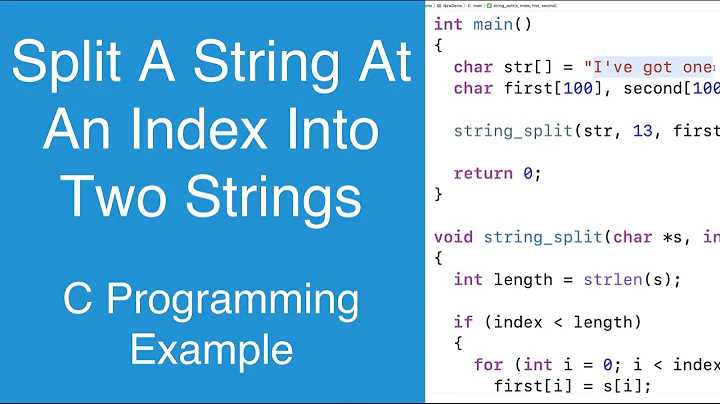How to split a string to 2 strings in C
Solution 1
#include <string.h>
char *token;
char line[] = "SEVERAL WORDS";
char *search = " ";
// Token will point to "SEVERAL".
token = strtok(line, search);
// Token will point to "WORDS".
token = strtok(NULL, search);
Update
Note that on some operating systems, strtok man page mentions:
This interface is obsoleted by strsep(3).
An example with strsep is shown below:
char* token;
char* string;
char* tofree;
string = strdup("abc,def,ghi");
if (string != NULL) {
tofree = string;
while ((token = strsep(&string, ",")) != NULL)
{
printf("%s\n", token);
}
free(tofree);
}
Solution 2
For purposes such as this, I tend to use strtok_r() instead of strtok().
For example ...
int main (void) {
char str[128];
char *ptr;
strcpy (str, "123456 789asdf");
strtok_r (str, " ", &ptr);
printf ("'%s' '%s'\n", str, ptr);
return 0;
}
This will output ...
'123456' '789asdf'
If more delimiters are needed, then loop.
Hope this helps.
Solution 3
char *line = strdup("user name"); // don't do char *line = "user name"; see Note
char *first_part = strtok(line, " "); //first_part points to "user"
char *sec_part = strtok(NULL, " "); //sec_part points to "name"
Note: strtok modifies the string, so don't hand it a pointer to string literal.
Solution 4
You can use strtok() for that Example: it works for me
#include <stdio.h>
#include <string.h>
int main ()
{
char str[] ="- This, a sample string.";
char * pch;
printf ("Splitting string \"%s\" into tokens:\n",str);
pch = strtok (str," ,.-");
while (pch != NULL)
{
printf ("%s\n",pch);
pch = strtok (NULL, " ,.-");
}
return 0;
}
Solution 5
If you have a char array allocated you can simply put a '\0' wherever you want.
Then point a new char * pointer to the location just after the newly inserted '\0'.
This will destroy your original string though depending on where you put the '\0'
Related videos on Youtube
Mark Szymanski
Updated on May 09, 2020Comments
-
Mark Szymanski about 4 years
I was wondering how you could take 1 string, split it into 2 with a delimiter, such as space, and assign the 2 parts to 2 separate strings. I've tried using
strtok()but to no avail.-
 Drew Delano over 14 yearsShow us your strtok() attempt.
Drew Delano over 14 yearsShow us your strtok() attempt.
-
-
 John Bode over 14 years
John Bode over 14 yearsstrtok()modifies its input, so using it on a string literal is bad juju (a.k.a undefined behavior). -
 John Bode over 14 yearsLooks good, except the second strtok() call is using a different delimiter.
John Bode over 14 yearsLooks good, except the second strtok() call is using a different delimiter. -
ereOn over 14 yearsYep. I forgot to mention that. Thanks.
-
 Drew Delano over 14 years@ereOn: Perhaps you missed the point. Your example is passing a pointer to a string literal, therefore strtok() will be modifying the string literal and invoking UB.
Drew Delano over 14 years@ereOn: Perhaps you missed the point. Your example is passing a pointer to a string literal, therefore strtok() will be modifying the string literal and invoking UB. -
thecoshman over 14 yearsWhat's the difference betwen strtok_r() and strtok()?
-
ereOn over 14 yearsMy point was to demonstrate the basic use of strtok(). Well, I admit that using string literals in this situation is a bad pratice and should be avoided. Fun fact: if you look at cplusplus.com/reference/clibrary/cstring/strtok you can see the same "mistake" in the example.
-
 Drew Delano over 14 yearsI think if you change
Drew Delano over 14 yearsI think if you changechar *line = "SEVERAL WORDS"tochar line[] = "SEVERAL WORDS", you're all set. -
ereOn over 14 yearsIf this is true, I just learned something. I thought those two instructions had the same meaning. My bad.
-
David Thornley over 14 years@ereOn: Pointers and arrays are different things in C, until you sneeze near an array, and then it turns into a pointer. That's how the array size expression
sizeof(arr)/sizeof(arr[0])works. -
ereOn over 14 yearsstrtok_r() is the reentrant version of strtok(). More about reentrancy here: en.wikipedia.org/wiki/Reentrant_%28subroutine%29
-
pmg over 11 years
strtok()is obsoleted? WOW!strsep()is not even Standard C. -
 Bitterblue over 11 years@ereOn Is it normal that strtok and strsep are throwing error signals ? Is there a way to avoid errors ? None of the code above worked without errors for me.
Bitterblue over 11 years@ereOn Is it normal that strtok and strsep are throwing error signals ? Is there a way to avoid errors ? None of the code above worked without errors for me. -
ereOn over 11 years@mini-me: I never heard of error signals using those functions. You probably should ask your own question (referring to this one, if it is relevant).



![C Strings 31: Split string by space into words [C Programming]](https://i.ytimg.com/vi/_i1Vj5RRIL8/hq720.jpg?sqp=-oaymwEcCNAFEJQDSFXyq4qpAw4IARUAAIhCGAFwAcABBg==&rs=AOn4CLCg-X85kvXafqURFY_fxPTo0HHqug)


